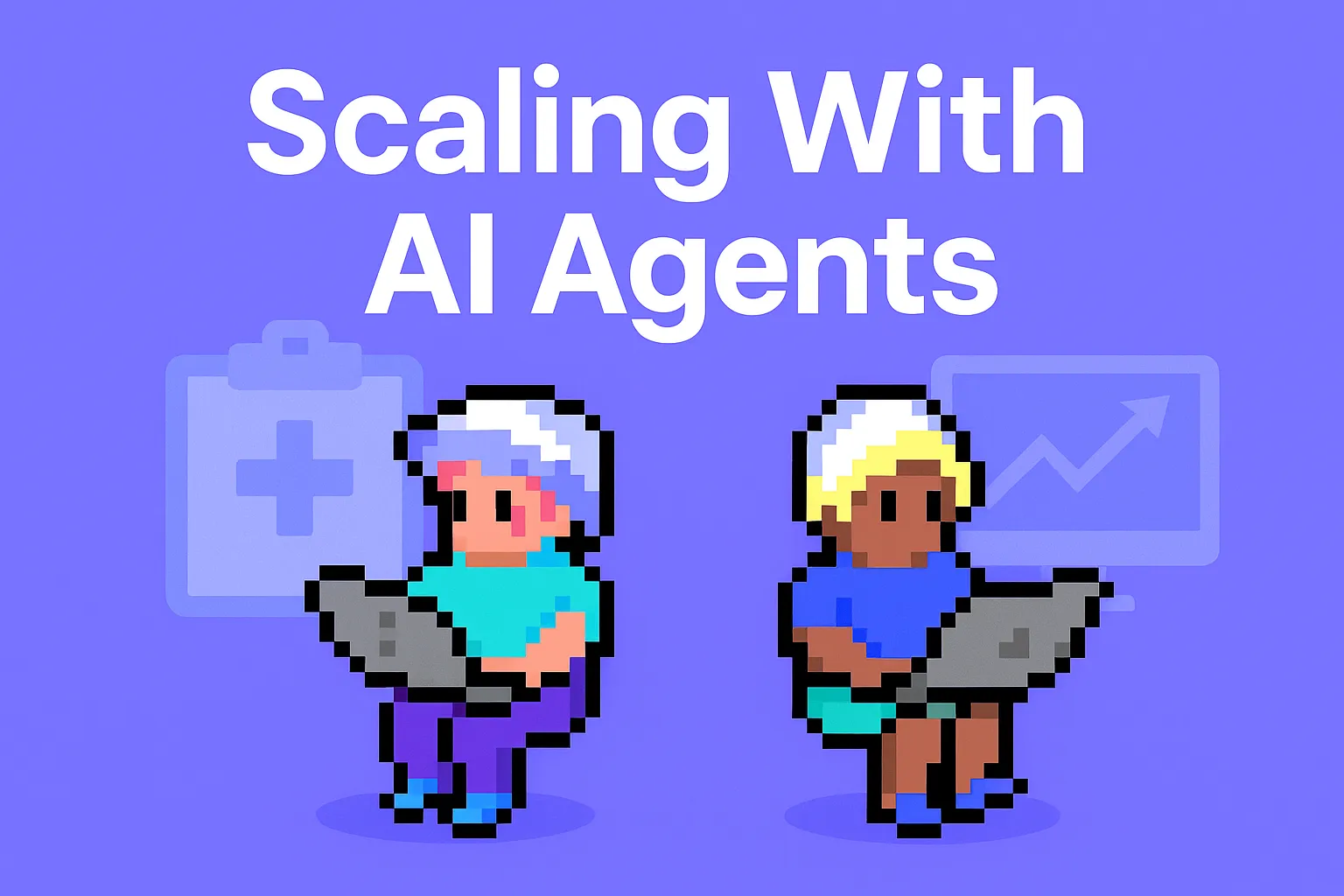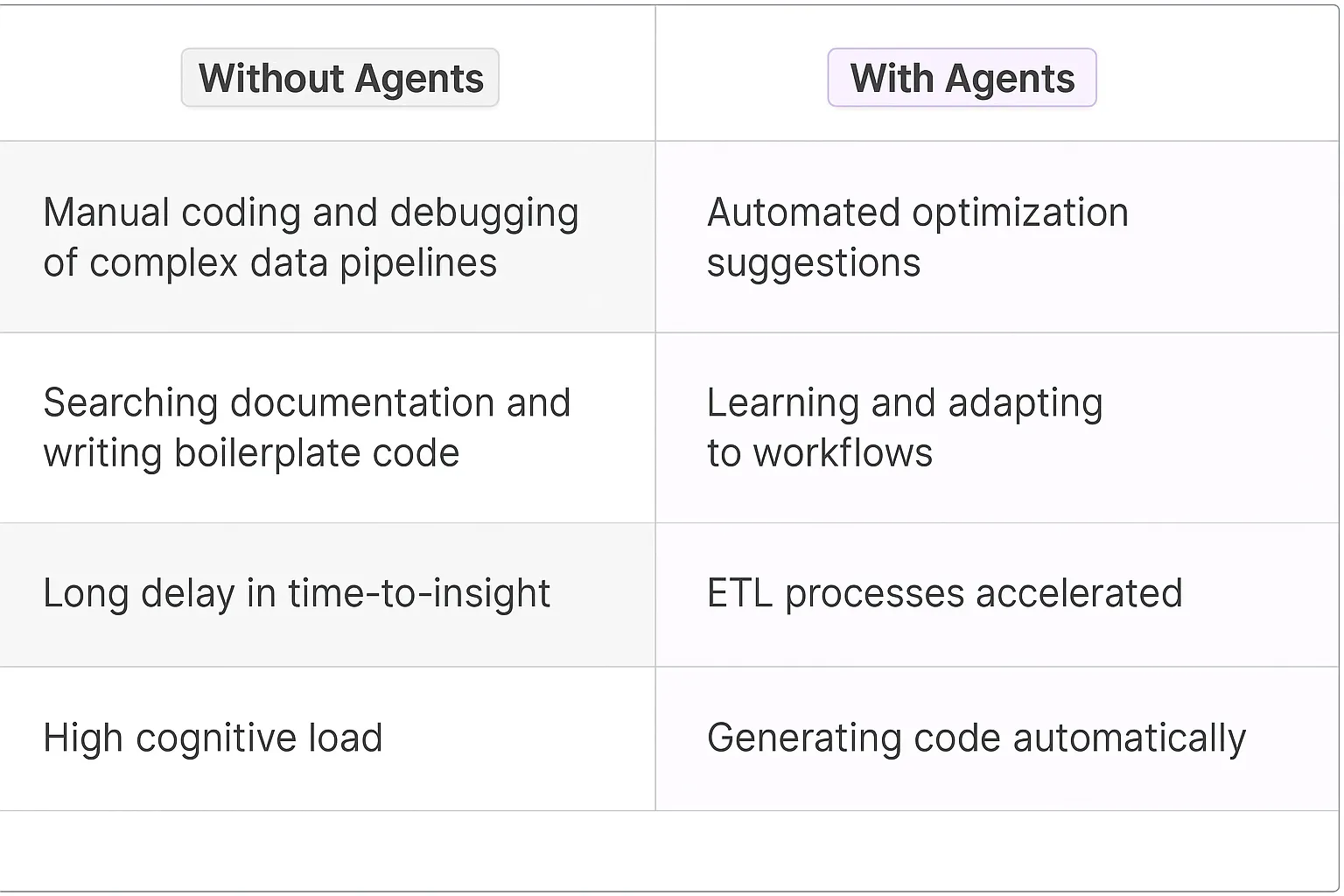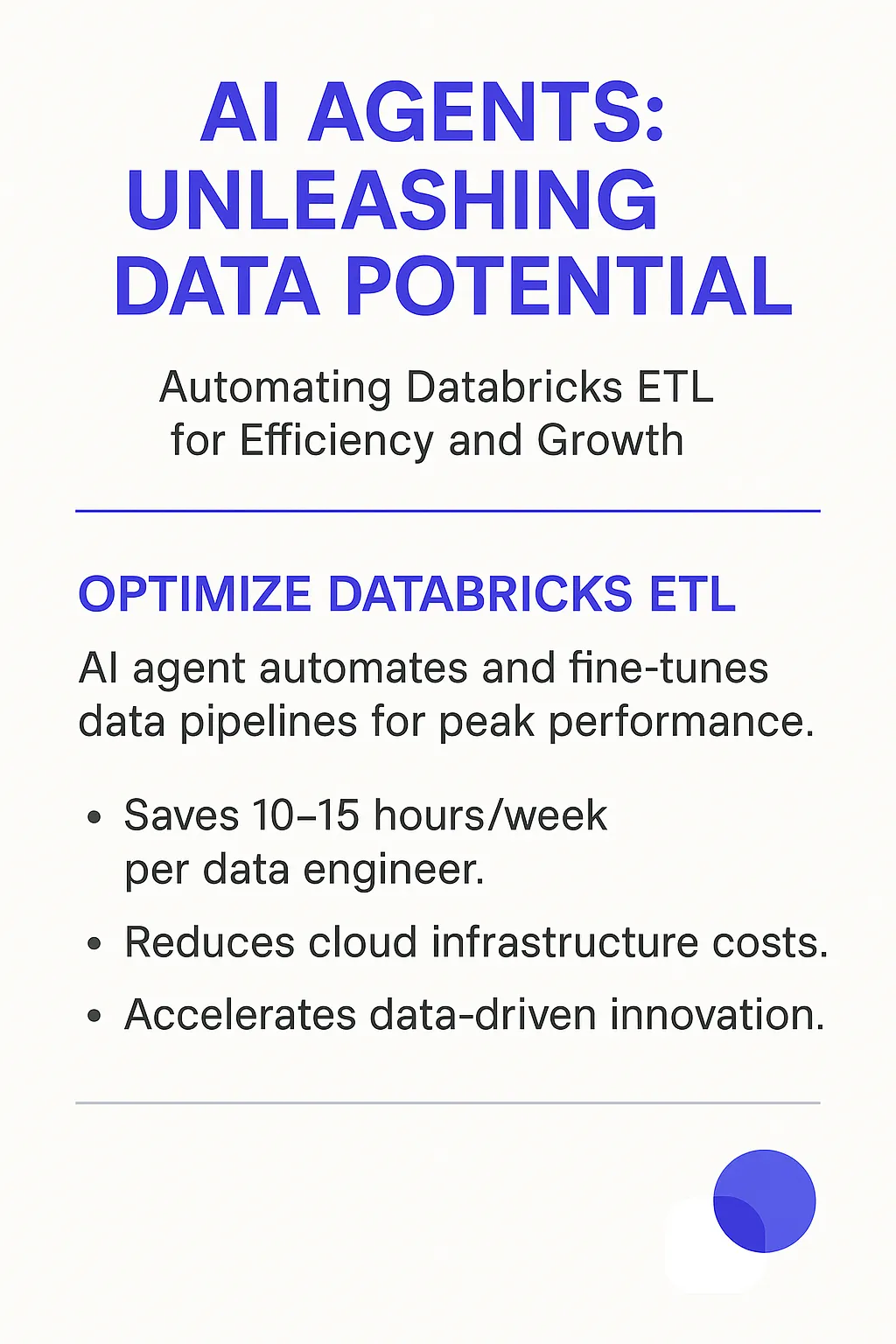Databricks AI Agents
Understanding Databricks and Its Key Features
Databricks is a unified analytics platform that combines the best of data warehouses and data lakes to offer an integrated solution for big data and machine learning. It's built on top of Apache Spark, providing a collaborative environment for data scientists, engineers, and analysts to work together on data projects at scale. Databricks simplifies the process of building and deploying big data processing applications and machine learning models.
Databricks stands out with its collaborative notebooks, which allow teams to write code, visualize data, and share insights in real-time. Its Delta Lake technology ensures reliable data management with ACID transactions. The platform offers automated cluster management, making it easy to scale resources up or down based on workload. Databricks also provides MLflow for managing the machine learning lifecycle and integrates seamlessly with popular data science tools and cloud services.

Benefits of AI Agents for Databricks
What would have been used before AI Agents?
Before AI agents entered the scene, Databricks users were stuck in a world of manual data wrangling and tedious coding. They'd spend hours writing complex queries, debugging pipelines, and optimizing performance. It was like trying to build a skyscraper with a hammer and nails – possible, but painfully slow and inefficient.
Data scientists and engineers would often find themselves drowning in a sea of documentation, desperately searching for that one crucial parameter or function. The learning curve was steep, and the cognitive load was immense. It was a classic case of tool complexity overshadowing the actual problem-solving.
What are the benefits of AI Agents?
Enter AI agents for Databricks – they're like having a team of seasoned data ninjas at your fingertips. These digital teammates don't just assist; they amplify your capabilities in ways that feel almost unfair (in a good way).
First off, they're context-aware savants. They understand the Databricks ecosystem at a deep level, allowing them to suggest optimizations that even experienced users might miss. It's like having a co-pilot who's memorized the entire flight manual and can anticipate turbulence before it hits.
But here's where it gets really interesting: these AI agents learn and adapt. They pick up on your coding style, your preferred workflows, and even your project-specific jargon. Over time, they become an extension of your data team, filling in knowledge gaps and accelerating decision-making processes.
The real game-changer is in how they handle the cognitive heavy lifting. Complex ETL processes that used to take days can now be sketched out in hours. They can generate boilerplate code, suggest schema optimizations, and even help troubleshoot performance bottlenecks. It's like having a brilliant intern who works at the speed of thought and never needs coffee breaks.
For organizations, this translates to a dramatic reduction in time-to-insight. Projects that once crawled along now sprint. And because these AI agents are constantly learning from the collective wisdom of the Databricks community, they bring best practices and cutting-edge techniques to every interaction.
The end result? Data teams can focus on strategy and innovation rather than getting bogged down in implementation details. It's a shift from being code monkeys to becoming data visionaries. And in a world where data is the new oil, that's the difference between merely surviving and thriving in the digital economy.

Potential Use Cases of AI Agents with Databricks
Processes
Databricks AI Agents are poised to transform how data teams operate. These digital teammates can take on complex data engineering tasks, freeing up human experts to focus on higher-level strategy and innovation. For instance, an AI Agent could continuously monitor data pipelines, detecting anomalies and automatically initiating corrective actions before issues escalate. This proactive approach minimizes downtime and ensures data integrity across the organization.
Another game-changing process is automated ETL optimization. The AI Agent can analyze query patterns, data volumes, and system performance metrics to suggest and implement optimizations to extract, transform, and load processes. This constant fine-tuning ensures that data workflows remain efficient as data scales and business needs evolve.
Tasks
On a more granular level, Databricks AI Agents excel at handling specific tasks that traditionally consume significant time and resources. Code generation and optimization stand out as prime examples. These digital teammates can generate boilerplate code for common Spark jobs, suggest performance improvements for existing scripts, and even refactor complex data transformations to leverage the latest Databricks features.
Data quality assurance is another area where AI Agents shine. They can automatically generate and run comprehensive test suites for data validation, ensuring that data meets predefined quality standards before it's used in downstream analytics or machine learning models. This level of automated scrutiny significantly reduces the risk of data-driven decisions based on flawed or inconsistent information.
Additionally, these AI Agents can take on the role of a virtual data steward, managing metadata, tracking data lineage, and enforcing data governance policies across the Databricks ecosystem. This ensures compliance with regulatory requirements and maintains a clear audit trail of data usage and transformations.
The potential of AI Agents in the Databricks environment is vast. They're not just tools; they're catalysts for a new era of data engineering and analytics. By offloading routine tasks and augmenting human capabilities, these digital teammates are set to unlock unprecedented levels of productivity and innovation in data-driven organizations.

Industry Use Cases
AI agents in Databricks are like having a team of data-savvy interns who never sleep and can crunch numbers at superhuman speeds. These digital teammates are reshaping how businesses operate across sectors. Let's dive into some real-world scenarios where Databricks AI agents are making waves:
Financial services firms are using these agents to detect fraud patterns that would take human analysts weeks to uncover. In healthcare, they're accelerating drug discovery by analyzing vast datasets of molecular structures. E-commerce giants are optimizing their supply chains in real-time, predicting demand spikes before they happen.
But it's not just about the big players. Small startups are leveraging Databricks AI agents to level the playing field, gaining insights that were once the domain of data analysis teams at Fortune 500 companies. These digital teammates are democratizing data analysis, allowing companies of all sizes to make data-driven decisions at scale.
The beauty of these AI agents lies in their ability to learn and adapt. They're not static tools but evolving partners that grow smarter with each interaction. As we explore specific use cases, you'll see how these agents are becoming indispensable across industries, transforming raw data into actionable intelligence.
Databricks AI Agents in Healthcare: Transforming Patient Care
Let's talk about how Databricks AI Agents are reshaping healthcare. It's not just about crunching numbers anymore; we're entering an era where AI becomes an integral part of the medical team.
Picture a hospital where Databricks AI Agents are deployed across various departments. These digital teammates are constantly analyzing patient data, from vitals to lab results, in real-time. They're not replacing doctors, but rather augmenting their capabilities in ways we couldn't have imagined a decade ago.
Here's where it gets interesting: These AI agents can spot patterns that might escape even the most experienced clinicians. They're processing vast amounts of historical data, current patient information, and the latest medical research simultaneously. This means they can flag potential issues before they become critical, suggesting interventions that could save lives.
But it's not just about reactive care. These AI agents are proactive. They're predicting patient outcomes, optimizing treatment plans, and even suggesting preventive measures based on a patient's genetic profile and lifestyle factors. It's personalized medicine on steroids.
The real game-changer? These Databricks AI Agents are learning and improving with every interaction. They're becoming more accurate, more nuanced in their recommendations, and more adept at handling complex medical scenarios. It's like having a medical resident who never sleeps, never forgets, and is always up-to-date with the latest medical knowledge.
This isn't science fiction. Hospitals implementing these AI agents are seeing tangible results: reduced readmission rates, improved patient outcomes, and more efficient resource allocation. It's a win for patients, doctors, and the healthcare system as a whole.
The potential here is enormous. As these AI agents continue to evolve, we could see a fundamental shift in how healthcare is delivered. It's not about replacing human expertise, but about creating a symbiotic relationship between AI and healthcare professionals that elevates patient care to unprecedented levels.
This is just the beginning. The applications of Databricks AI Agents in healthcare are vast and we're only scratching the surface. It's an exciting time to be at the intersection of AI and healthcare, and I can't wait to see what comes next.
Databricks AI Agents in Finance: Redefining Risk Management
The finance industry is on the cusp of a major transformation, and Databricks AI Agents are at the forefront. These digital teammates are not just crunching numbers; they're reshaping how we approach risk management in ways that were unimaginable just a few years ago.
Let's dive into how this plays out in real-world scenarios. Financial institutions are deploying Databricks AI Agents to analyze vast amounts of market data, transaction histories, and global economic indicators in real-time. These AI agents are processing information at a scale and speed that human analysts simply can't match.
What's truly fascinating is how these AI agents are identifying subtle patterns and correlations that often slip past even the most seasoned risk managers. They're not just flagging obvious red flags; they're uncovering hidden risks that could potentially snowball into major issues if left unchecked.
But here's where it gets really interesting: These AI agents aren't static tools. They're constantly learning and adapting. Every market fluctuation, every transaction, every economic report feeds into their models, making them smarter and more accurate over time. It's like having a risk management team that never sleeps and is always getting better at its job.
The impact on decision-making is profound. Financial institutions using these AI agents are able to make more informed, data-driven decisions about everything from loan approvals to investment strategies. They're not just reacting to market changes; they're anticipating them, sometimes days or even weeks in advance.
What excites me most is the potential for democratizing sophisticated risk management. Smaller financial institutions, which previously couldn't afford large teams of risk analysts, can now leverage these AI agents to compete on a more level playing field with larger institutions.
We're also seeing these AI agents play a crucial role in fraud detection. They're identifying unusual patterns in transactions that might indicate fraudulent activity, often catching things that traditional rule-based systems miss. This isn't just saving money; it's building trust in our financial systems.
The regulatory implications are huge too. These AI agents are helping financial institutions stay compliant with ever-changing regulations by continuously monitoring transactions and flagging potential compliance issues in real-time.
Looking ahead, I see Databricks AI Agents becoming an indispensable part of the financial ecosystem. They're not replacing human expertise, but rather augmenting it in ways that make our financial systems more robust, more efficient, and ultimately, more trustworthy.
This is just the beginning. As these AI agents continue to evolve, we'll likely see new financial products and services that we can't even imagine today. It's an exciting time to be in fintech, and I'm eager to see how this technology will reshape the industry in the coming years.
Considerations and Challenges in Implementing Databricks AI Agents
Technical Challenges
Implementing Databricks AI Agents isn't a walk in the park. You're essentially trying to merge cutting-edge AI with complex data ecosystems. It's like trying to teach a fish to climb a tree while simultaneously asking it to solve differential equations.
First off, data quality is a massive hurdle. Your AI agent is only as good as the data it's trained on. If your data is messy, incomplete, or biased, your agent will be about as useful as a chocolate teapot. Ensuring data cleanliness and integrity across diverse sources is a Herculean task that many teams underestimate.
Then there's the integration challenge. Databricks environments are often sprawling ecosystems with multiple data sources, pipelines, and tools. Getting your AI agent to play nice with all these moving parts is like conducting an orchestra where every instrument is from a different century. You need to nail down APIs, manage data flows, and ensure real-time synchronization – all while maintaining performance.
Operational Challenges
On the operational front, things get even hairier. Implementing AI agents isn't just a tech problem; it's a people problem. You're essentially introducing a new "digital teammate" into established workflows. This can be as disruptive as dropping a cat into a room full of pigeons.
Change management becomes crucial. You'll need to train your human team to work alongside these AI agents effectively. This isn't just about technical skills; it's about fostering a culture that embraces AI collaboration. Many teams struggle with this, leading to underutilization or outright rejection of the AI tools.
Governance and compliance are another can of worms. As your AI agent interacts with sensitive data, you need robust frameworks to ensure data privacy, security, and regulatory compliance. This isn't just about ticking boxes; it's about building trust in your AI systems, both internally and with clients.
Lastly, there's the ever-present challenge of ROI justification. AI implementations can be costly, and the benefits aren't always immediately tangible. You'll need to develop clear metrics and KPIs to measure the impact of your AI agents. This often requires a shift in how you evaluate productivity and value creation in your data operations.
Implementing Databricks AI Agents is a complex endeavor that goes far beyond just technical integration. It requires a holistic approach that addresses both the hard tech challenges and the softer operational hurdles. Get it right, and you'll have a powerful ally in your data operations. Get it wrong, and you'll have an expensive digital paperweight.
Embracing AI Agents: The Future of Data Analytics
The integration of AI agents into Databricks marks a pivotal shift in how organizations handle data and analytics. These digital teammates are not just tools; they're catalysts for innovation, enabling data teams to focus on strategy rather than getting bogged down in implementation details. From healthcare to finance, AI agents are unlocking new possibilities, accelerating insights, and driving competitive advantage.
However, the journey isn't without its challenges. Technical hurdles like data quality and integration complexity, coupled with operational issues around change management and ROI justification, require careful navigation. Organizations that successfully implement these AI agents will find themselves at the forefront of the data revolution, capable of making faster, more informed decisions and driving real business value.
As we look to the future, the potential of AI agents in Databricks environments is boundless. They're set to become an indispensable part of data teams, continuously learning and evolving to meet new challenges. The organizations that embrace this technology now, despite the hurdles, will be the ones shaping the future of data-driven decision making. It's an exciting time to be in the world of data, and AI agents are just the beginning of what's possible.













